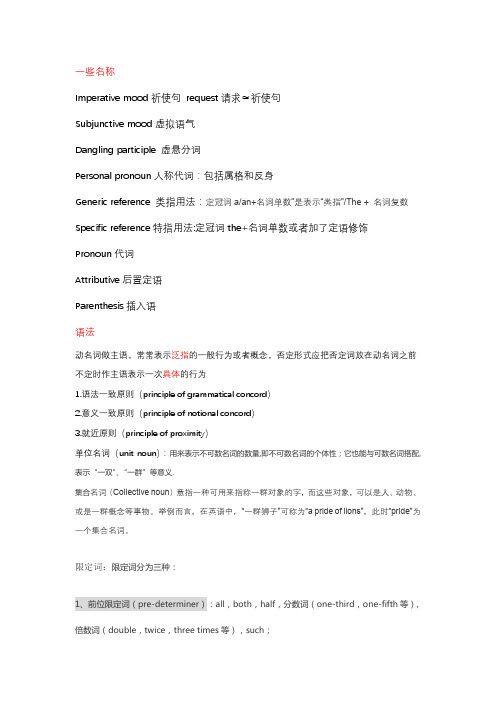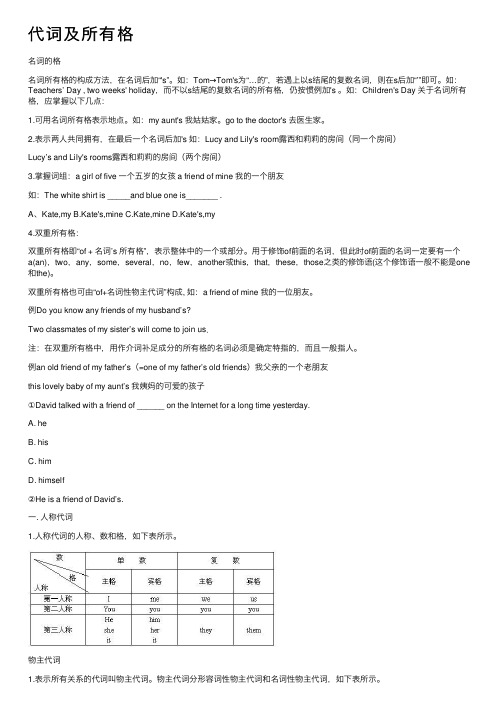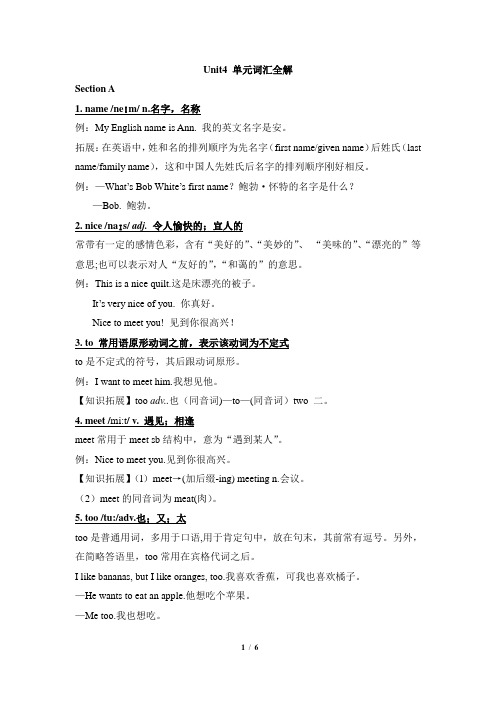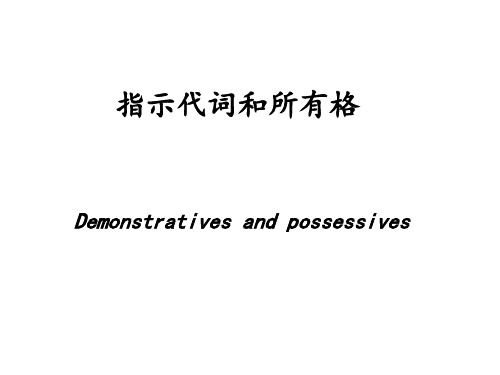unit 4指示代词和所有格
英语专四语法

一些名称Imperative mood祈使句request请求≈祈使句Subjunctive mood虚拟语气Dangling participle 虚悬分词Personal pronoun人称代词:包括属格和反身Generic reference 类指用法:定冠词a/an+名词单数”是表示“类指”/The + 名词复数Specific reference特指用法:定冠词the+名词单数或者加了定语修饰Pronoun代词Attributive后置定语Parenthesis插入语语法动名词做主语,常常表示泛指的一般行为或者概念,否定形式应把否定词放在动名词之前不定时作主语表示一次具体的行为1.语法一致原则(principle of grammatical concord)2.意义一致原则(principle of notional concord)3.就近原则(principle of proximity)单位名词(unit noun):用来表示不可数名词的数量,即不可数名词的个体性;它也能与可数名词搭配,表示“一双”、“一群”等意义.集合名词(Collective noun)意指一种可用来指称一群对象的字,而这些对象,可以是人、动物、或是一群概念等事物。
举例而言,在英语中,“一群狮子”可称为“a pride of lions”,此时“pride”为一个集合名词。
限定词:限定词分为三种:1、前位限定词(pre-determiner):all,both,half,分数词(one-third,one-fifth等), 倍数词(double,twice,three times等),such;2、中位限定词(central-determiner):冠词(a,an,the),指示代词(this,that,these,those),不定代词(some,any,either),否定词(no,neither),全称限定词(every,each),所有格(my,your,John's);3、后位限定词(post-determiner):基数词(three,200),序数词(first,second,300th,last),数量词及短语(many,much,little,few,plenty of,a lot of,a large number of)等。
指示代词

代词一:指示代词1.指示代词有this , that , these , those , such , same.2.指示代词的用法:(1).that 常用来代替前面出现的人.事. 物,以免重复.that代替可数名词和不可数名词;those可代替复数名词.2.指示代词的用法:(1).that 常用来代替前面出现的人.事.物,以免重复.that代替可数名词和不可数名词;those可代替复数名词.(2). 在打电话时,英语中常用this代替自己,that代替对方.例如:A: May I speak to Mr. Zhang, please?B: This is Zhang Ming speaking. Who’s that.(3). Such表示“如此,这样的人或事”.I have never seen such an interesting film before.(4). Same 表示“ 同样的人和物”,前面必须加the.例如:They arrived there at the same time.Lucy and Lily are in the same class.They do the same thing everyday.经典例析1.The weather in Australia is quite different from ___ of Shijiazhuang.A. itB. thatC. thoseD. ones2. The cars made in Japan are much cheaper than __ made in America.A. onesB. thoseC. thatD. it3.Can you believe that in _____ a rich country there should be ____ manypoor people ?A. such ; suchB. such ; soC. so ; soD. so ; such4. ---Hello! May I speak to Jim, please?--- Speaking. ___________?A. how are youB. Is that MikeC. are you JimD. who are you5. There are more people in Shanghai than in Tianjin. (同义句)The ____________ of shanghai is _______ than ______ of Tianjin.6. This is the most interesting book that I have ever read.(同义句)I have _______ read _______ an interesting book before.二:不定代词1.不定代词主要有: each , every , both,all , either , neither , none , one , few ,a few , little , a little, many , much, other , another , some , any , no 以及some , any, no 和thing构成的合成词.不定代词的用法(1). Some , any , something , anything① Some和something多用于肯定句中.当说话人期望得到对方的肯定回答或表示请求建议时,some , something可用于疑问句中,而不用any 和anything.例如:②any和anything一般用于否定句.疑问句和条件句中.例如:1. Please ask the teacher if you have any questions to ask.2.There isn’t anything new in today’s newspaper.3. He is taller than any other boy in his class.注意事项1.形容词或不定式修饰不定代词时,作后置定语.★Be quiet ! I have something important to tell you.2. 不定代词作主语时谓语用单数.★Listen ! Someone is singing in the next room.3.Nothing表示否定,表示“什么事都没有”.等于not…anything. 反意疑问句使用肯定.He knew nothing about the accident, did he ?The police found nothing in the room.=The police didn’t find anything in the room.3.Nothing表示否定,表示“什么事都没有”.等于not…anything. 反意疑问句使用肯定.He knew nothing about the accident, did he ?The police found nothing in the room.=The police didn’t find anything in the room.1.I have some questions to ask you.2.There is something wrong with my watch. It doesn’t work.3.---Would you like something to drink ?--- No, thanks.4.---May I ask you some questions ?---Certainly. What’s it ?5.---Can I have some meat ?---Sure, here you are.三:经典例析1.Be quiet, boys and girls . I have ____to tell you.A. important somethingB. something importantC. anything importantD. important anything2. ---I feel a bit hungry.---Why don’t you have ____ bread?A. anyB. someC. littleD. a3. The teacher said nothing at the meeting yesterday .(同义句)The teacher ______ say __________ at the meeting yesterday.(2). each 和everyeach指两者或两者当中的人或事物中的每一个.every指三者或三者当中的每一个.each “每个,各,各自的”,强调个体;every强调整体,表示“每个都”.★There are many trees and flowers on each side of the street.★Every student has read this story.经典例析1.---How often are the Olympic Gams held?---______ four years.A. EveryB. EachC. InD. For2.There are many trees on ____ side of the street.A. allB. everyC. neitherD. each(3).both 和all ; neither 和either,both 表示“两者都”,常和and连用,作主语时,谓语动词用复数形式.all指“三者或三者以上的全体”.例如:Both mother and father are teachers.They all like this story.either指“两个之间,其中的一个”,常和or搭配使用:either …or…意为“不是……就是; 或者……或者”.而neither是指“两个人或事物中一个也不”,是both 的全盘否定,常和nor搭配.either…or…和neither…nor…连接的并列结构作主语时,谓语坚持就近原则★Neither people nor plants can live without water or air.★There is only one seat here, either you or I can take it.经典例析1.They were all asleep. _____ of themheard the sound.A. AllB. BothC. NoneD. Neither2.Both of them are right.(同义句)_________ of them _____ wrong.3.All of us have been to Shanghai. (否定句)______ of us ____ been to Shanghai.4. Liu Xiang and Yao Ming are world-famous sports stars.____ of them have set a good example to us.A. AllB. NeitherC. BothD. None5.---Can you come and give us a talk on Thursday or Friday?---I’m afra id ____ day is possible.A. eitherB. neitherC. everyD. any6.---May I use your pen?---Yes, here are two and you can use _____ of them.A. bothB. everyC. anyD. either7. Which do you prefer, a bottle of orange or a bottle of milk ?___, thanks. I’d just like a cup of tea.A. EitherB. NeitherC. BothD. None8. They were all tired, but _____ of them stopped to have a rest.9. I have two watches, but __ of them works well.A. bothB. allC. neitherD. none10. ---When shall we meet again, this Sunday or next Sunday ?--- _____ time is OK.A. EitherB. AnyC. AnotherD. One(4) few , a few ; little , a little,few , a few 修饰可数名词,little, a little修饰不可数名词. Few , little 表示否定,意为“几乎没有”,a few , a little 表示肯定,意为“有一些”.例如:I can’t buy the dress because I havejust a little money.Few people can live to be 150 years.经典例析1. Kate is a nice girl. She says _____ but do much.A. fewB. a fewC. littleD. a little2. I have a little good friends in our class.(改错)3. There is little water in the bottle, ___ _______? (补全反意疑问句)4. Few of them hurt themselves in the accident last night,________?A. don’t theyB. do theyC. didn’t theyD. did they5. My uncle is so busy that he has ___time to have a good rest.A. fewB. a fewC. littleD. a little6. ____ of them can arrive in time, can they ?A. FewB. A fewC. LittleD. A little(5).other , others ,another , the other①other 泛指“另外的或其它的人和物”, 常做定语.例如:★ I don’t like this color, have you got any other colors?②Others泛指“另一些人和物”,相当于名词性物主代词.例如:★ Study harder, or you’ll fall behind the others.③another泛指三者.三者以上不定数目中的“另一个”,只可修饰或代替单数名词.例如:★ Would you like another cake?★ Could you please show me another pair?④the other特指“两者中的另一个人或物”.常和one对照使用, one …the other …一个……另一个…….★I have two pencils , one is long , the other is short.不可不记another +基数词+复数名词=基数词+more+复数名词,another和more表示“还,再……”,但当基数词是one时,名词要用单数.例如:★I want to have another two apples.★I want to have two more apples.经典例析1. I have finished this book, can you lend me ______?A. two more booksB. two another booksC. more two booksD. two books another2.I have two brothers. One is a doctor. _______ is a teacher.A. otherB. the otherC. othersD. another3. Have you finished your homework?Not yet. I think it will take ____ ten minutes.A. otherB. othersC. anotherD. more4.Shanghai is the largest city in China(同义句)Shanghai is ______ than ____ ____ city in China.四:疑问代词疑问代词who, whom, whose , what 和which都是用来构成特殊疑问的.who 通常作主语和表语,whom作宾语.What可用来提问职业.人口.价格.年龄.颜色.日期.星期.高度和尺寸的大小.经典例析1.---_______ is your favourite athlete?--- Liu Xiang.A. WhoseB. WhomC. WhoD. Which2. ---_____ does your father look like?--- He is tall and thin.A. WhatB. WhereC. WhoD. Which3. ---______ man is your father ?---The one in a white shirt.A. WhoB. WhatC. WhoseD. Which4.The man who is watering the flowers is my uncle.(划线提问)_____ _____ is your uncle ?5. The watch is 180 Yuan.(划线提问)______ is the _______ of the watch?五:关系代词1.Who 是主格,只可指认。
指示代词和所有格

There are some trees near the river. 河的附近有一些树。
There is a desk and two chairs in the room. 房间里有一张桌子和两把椅子。 (最近一个主语是:a desk)
There are two chairs and a desk in the room. 房间里有两把椅子和一张桌子。 (最近一个主语是two chairs)
-Where’s the soccer ball? -It’s _in__f_r_o_n_t _o_f the box.
-Where’s the soccer ball? -It’s __b_e_h_in_d___ the box.
-Where is the soccer ball? -It’s a_c_r_o_s_s_f_r_o_m__ the box.
No ,there isn`t .
Are there any books in the library? Yes, there are. Are there any students in the library? No, there aren`t.
注意:There be有There is和 There are 两种形式。由最近一个主语来决定be 的单复数。当最近一个主语为单数或 不可数名词时, 用There is;为复数时, 用There are。 如:There is a book on the desk.
That is an eraser.
Those are erasers.
This is a backpack. These are backpacks
That is a ruler.
Unit 4指示代词和所有格

‘s 所有格的用法 1.表示有生命的东西的名词末尾加\’s. 例如: Jim‘s bed the man’s wife 2.以-es或-s结尾的名词末尾加‚‘s”。例如:the students’ books Teachers’Day 3.有些表示时间、距离、度量衡、价值、自然现象、国家、城镇等无生命东西的 名词,也可以加‘s构成所有格。 例如: today's newspaper, five minutes'walk, a ton's weight 4.表示两者共同拥有的人或物(共有)时,只需要后一个名词加’s(或’)即 可。 如果表示两者各自的所属关系(各自所有),则每个名词词尾都加上’s (或 ’)。例如: Joan and Jane’s room(房间属二人共同所有) Joan's and Jane's room(指Joan和Jane各自的房间)
词
复数
my your
our your their
第三人称 his/her/its
2、 名
词 性 物 主 代 词
单数 复数
第一人称
mine
ours
第二人称
yours
yours
theirs
第三人称 his /hers/its
代 词
人称代 词
我
你
他
她
它
我们
你们
他们
主格 宾格
物主代 词
I
me 我的
you
you 你的
he she
him 他 的 her
it
it
we
us
you
you 你们的
they
them 他们的
她的 它的 我们 的
新人教版七年级上Unit1Unit4知识点归纳

新人教版七年级上Unit1-Unit4知识点归纳恭喜你掌握了预备篇知识点。
下面转入正式篇。
英语每个单元都安排一个日常交际用语话题,所以以后每学到一个单元,想一下是谈什么话题呢?Unit1. My name’s Gina.(一)一、这个单元是学会提问他人叫什么名字。
What’s your name?What’s his name? What’s her name? 回答:My name is …..(或I am….)(His name is …..; Her name is…….)二、学会自我介绍: My name is Gina. My name is…. 或说: I am….三、How do you do? 你好。
注意一看这个句子好像是问句,其实它不是。
它是用在两个人第一次见面时说的客套语。
回答也用How do you do?你好。
四、Nice to meet you. 遇见你很高兴。
回答也用Nice to meet you,too.(注意后面加了一个too.这个too是也的意思。
遇见你也很高兴。
)五、如果生活中老是直称呼人的名字,显得啰嗦极了。
于是英语出现了代替人的人称代词,本单元我们要掌握人称代词的主格。
(常作主语,放在谓语前面哦)I和 you你,你们 he他 she她 it它;we我们 they他们她们它们。
六、刚才在本单元第一个知识点里的my 我的;his他的 ;her她的(某某的)表属某人(物的主人)所有,英语中叫这类词物主代词。
my我的 your你的,你们的; his他的 her她的; its它的 our我们的 their他们的。
Unit1. My name’s Gina.(二)一、be的用法。
细心的同学们一定看到,很多英语句子中都有is aream.(是的意思)英语中把这几个单词称为be(是)。
be的用法由它的主语决定,请记住下面的口诀:I用am来,you用are;is用于他她它;所有复数都用are;不要乱用闹笑话。
指示代词

代词一:指示代词1.指示代词有this , that , these , those , such , same.2.指示代词的用法:(1).that 常用来代替前面出现的人.事. 物,以免重复.that代替可数名词和不可数名词;those可代替复数名词.2.指示代词的用法:(1).that 常用来代替前面出现的人.事.物,以免重复.that代替可数名词和不可数名词;those可代替复数名词.(2). 在打电话时,英语中常用this代替自己,that代替对方.例如:A: May I speak to Mr. Zhang, please?B: This is Zhang Ming speaking. Who’s that.(3). Such表示“如此,这样的人或事”.I have never seen such an interesting film before.(4). Same 表示“ 同样的人和物”,前面必须加the.例如:They arrived there at the same time.Lucy and Lily are in the same class.They do the same thing everyday.经典例析1.The weather in Australia is quite different from ___ of Shijiazhuang.A. itB. thatC. thoseD. ones2. The cars made in Japan are much cheaper than __ made in America.A. onesB. thoseC. thatD. it3.Can you believe that in _____ a rich country there should be ____ manypoor people ?A. such ; suchB. such ; soC. so ; soD. so ; such4. ---Hello! May I speak to Jim, please?--- Speaking. ___________?A. how are youB. Is that MikeC. are you JimD. who are you5. There are more people in Shanghai than in Tianjin. (同义句)The ____________ of shanghai is _______ than ______ of Tianjin.6. This is the most interesting book that I have ever read.(同义句)I have _______ read _______ an interesting book before.二:不定代词1.不定代词主要有: each , every , both,all , either , neither , none , one , few ,a few , little , a little, many , much, other , another , some , any , no 以及some , any, no 和thing构成的合成词.不定代词的用法(1). Some , any , something , anything① Some和something多用于肯定句中.当说话人期望得到对方的肯定回答或表示请求建议时,some , something可用于疑问句中,而不用any 和anything.例如:②any和anything一般用于否定句.疑问句和条件句中.例如:1. Please ask the teacher if you have any questions to ask.2.There isn’t anything new in today’s newspaper.3. He is taller than any other boy in his class.注意事项1.形容词或不定式修饰不定代词时,作后置定语.★Be quiet ! I have something important to tell you.2. 不定代词作主语时谓语用单数.★Listen ! Someone is singing in the next room.3.Nothing表示否定,表示“什么事都没有”.等于not…anything. 反意疑问句应用肯定.He knew nothing about the accident, did he ?The police found nothing in the room.=The police didn’t find anything in the room.3.Nothing表示否定,表示“什么事都没有”.等于not…anything. 反意疑问句应用肯定.He knew nothing about the accident, did he ?The police found nothing in the room.=The police didn’t find anything in the room.1.I have some questions to ask you.2.There is something wrong with my watch. It doesn’t work.3.---Would you like something to drink ?--- No, thanks.4.---May I ask you some questions ?---Certainly. What’s it ?5.---Can I have some meat ?---Sure, here you are.三:经典例析1.Be quiet, boys and girls . I have ____to tell you.A. important somethingB. something importantC. anything importantD. important anything2. ---I feel a bit hungry.---Why don’t you have ____ bread?A. anyB. someC. littleD. a3. The teacher said nothing at the meeting yesterday .(同义句)The teacher ______ say __________ at the meeting yesterday.(2). each 与everyeach指两者或两者当中的人或事物中的每一个.every指三者或三者当中的每一个.each “每个,各,各自的”,强调个体;every强调整体,表示“每个都”.★There are many trees and flowers on each side of the street.★Every student has read this story.经典例析1.---How often are the Olympic Gams held?---______ four years.A. EveryB. EachC. InD. For2.There are many trees on ____ side of the street.A. allB. everyC. neitherD. each(3).both 与all ; neither 与either,both 表示“两者都”,常与and连用,作主语时,谓语动词用复数形式.all指“三者或三者以上的全体”.例如:Both mother and father are teachers.They all like this story.either指“两个之间,其中的一个”,常与or搭配使用:either …or…意为“不是……就是; 或者……或者”.而neither是指“两个人或事物中一个也不”,是both 的全盘否定,常与nor搭配.either…or…和neither…nor…连接的并列结构作主语时,谓语坚持就近原则★Neither people nor plants can live without water or air.★There is only one seat here, either you or I can take it.经典例析1.They were all asleep. _____ of themheard the sound.A. AllB. BothC. NoneD. Neither2.Both of them are right.(同义句)_________ of them _____ wrong.3.All of us have been to Shanghai. (否定句)______ of us ____ been to Shanghai.4. Liu Xiang and Yao Ming are world-famous sports stars.____ of them have set a good example to us.A. AllB. NeitherC. BothD. None5.---Can you come and give us a talk on Thursday or Friday?---I’m afraid ____ day is possible.A. eitherB. neitherC. everyD. any6.---May I use your pen?---Yes, here are two and you can use _____ of them.A. bothB. everyC. anyD. either7. Which do you prefer, a bottle of orange or a bottle of milk ?___, thanks. I’d just like a cup of tea.A. EitherB. NeitherC. BothD. None8. They were all tired, but _____ of them stopped to have a rest.9. I have two watches, but __ of them works well.A. bothB. allC. neitherD. none10. ---When shall we meet again, this Sunday or next Sunday ?--- _____ time is OK.A. EitherB. AnyC. AnotherD. One(4) few , a few ; little , a little,few , a few 修饰可数名词,little, a little修饰不可数名词. Few , little 表示否定,意为“几乎没有”,a few , a little 表示肯定,意为“有一些”.例如:I can’t buy the dress because I havejust a little money.Few people can live to be 150 years.经典例析1. Kate is a nice girl. She says _____ but do much.A. fewB. a fewC. littleD. a little2. I have a little good friends in our class.(改错)3. There is little water in the bottle, ___ _______? (补全反意疑问句)4. Few of them hurt themselves in the accident last night,________?A. don’t theyB. do theyC. didn’t theyD. did they5. My uncle is so busy that he has ___time to have a good rest.A. fewB. a fewC. littleD. a little6. ____ of them can arrive in time, can they ?A. FewB. A fewC. LittleD. A little(5).other , others ,another , the other①other 泛指“另外的或其它的人和物”, 常做定语.例如:★ I don’t like this color, h ave you got any other colors?②Others泛指“另一些人和物”,相当于名词性物主代词.例如:★ Study harder, or you’ll fall behind the others.③another泛指三者.三者以上不定数目中的“另一个”,只可修饰或代替单数名词.例如:★ Would you like another cake?★ Could you please show me another pair?④the other特指“两者中的另一个人或物”.常与one对照使用, one …the other …一个……另一个…….★I have two pencils , one is long , the other is short.不可不记another +基数词+复数名词=基数词+more+复数名词,another和more表示“还,再……”,但当基数词是one时,名词要用单数.例如:★I want to have another two apples.★I want to have two more apples.经典例析1. I have finished this book, can you lend me ______?A. two more booksB. two another booksC. more two booksD. two books another2.I have two brothers. One is a doctor. _______ is a teacher.A. otherB. the otherC. othersD. another3. Have you finished your homework?Not yet. I think it will take ____ ten minutes.A. otherB. othersC. anotherD. more4.Shanghai is the largest city in China(同义句)Shanghai is ______ than ____ ____ city in China.四:疑问代词疑问代词who, whom, whose , what 和which都是用来构成特殊疑问的.who 通常作主语和表语,whom作宾语.What可用来提问职业.人口.价格.年龄.颜色.日期.星期.高度和尺寸的大小.经典例析1.---_______ is your favourite athlete?--- Liu Xiang.A. WhoseB. WhomC. WhoD. Which2. ---_____ does your father look like?--- He is tall and thin.A. WhatB. WhereC. WhoD. Which3. ---______ man is your father ?---The one in a white shirt.A. WhoB. WhatC. WhoseD. Which4.The man who is watering the flowers is my uncle.(划线提问)_____ _____ is your uncle ?5. The watch is 180 Yuan.(划线提问)______ is the _______ of the watch?五:关系代词1.Who 是主格,只可指认。
1-unit4语法(人称代词和物主代词)

1. The stepmother was cruel to Mary and her brother. 2. Mind your own business. 3. We want to have a house of our own.
物主代词
• 名词性物主代词用作名词,在句中 作主语,表语,和宾语 1. May I borrow your pen? Mine is missing. 2. The dictionary over there is his. 3. I’ll do my work and you yours.
he和she的特殊用法
The moon loses her brilliance when the sun makes his appearance. She was Titanic, a ship which was said never to sink.
物主代词
• 物主代词表示所有关系的代词, 也可叫做代词所有格。
I
you
he him
she her
it it
me you
we you
us you
they
them
物主代词
形容词性 名词性 形容词性
my your his her its
mine yours our your ours yours his hers its their theirs
名词性
人称代词 主格 宾语
-- You ought to do it at once. -- What? Me!
he和she的特殊用法
he可指代雄性动物或庞大而又威猛之物, 也可在谚语中泛指大象;she可指代雌性动 物或柔弱、优美之物,也可代表拟人化说法 中的国家、月亮、汽车、轮船等无生命的 东西,以表达其喜爱或亲切之情。 He who laughs last laughs best. The moon loses her brilliance when the sun makes his appearance. She was Titanic, a ship which was said never to sink.
人教版七年级上册英语Unit 4知识点梳理及语法讲义(教师版)

七年级上册英语Unit 4知识点与语法精讲精练词汇梳理(一)完成单词梳理:名词:1. table桌子 2. bed 床 3. bookcase 书架;书柜4. sofa 沙发5. chair 椅子6. desk 书桌7. room 房间8. hat 帽子9. head 头10. radio 收音机11. clock 时钟12. tape 磁带;录音带13. player 播放机14. model 模型15. plane 飞机动词:1. come 来;来到 2. think 认为;想;思考 3. know 知道;了解代词:1. their 他(她、它)们的 2. our 我们的介词:1. on 在……上 2. under 在……下副词:1. where 在哪里;到哪里 2. everywhere 处处;到处;各个地方3. always 总是连词:1. but 但是形容词:1. tidy 整洁的;井井有条的感叹词:1. yeah 是的;对(二) 词汇变形小结:1. they (人称代词主格:他/她/它们) — them (人称代词宾格) — their (形容词性物主代词:他/她/它们的) — theirs (名词性物主代词:他/她/它们的)2. tidy (adj. 整洁的) — untidy (反义词:不整洁的)3. radio (n. 收音机) — radios (复数)4. we(人称代词主格:我们) — us (人称代词宾格) — our (形容词性物主代词:我们的) — ours (名词性物主代词:我们的)【练一练】用所给词的适当形式填空1.Look! Those are four beds (bed) in my house.rry and I are Bill’s daughters, so Bill is our (we) father.3.Those old CD players ( player) are very nice.4.Susan and Emma thank their (they) teacher for helping them find the keys.5.Tina comes (come) to the gym and plays sports.6.These rooms (room) are too small.7.Look! Your model plane is (be) on the sofa.8.The Chinese book is his (he).9.Look at my mother’s (mother) room. It’s very clean.10.These are their (they) baseballs.(三) 短语攻关:come on快点儿tape player 磁带播放机model plane飞机模型on the sofa 在沙发上in one’s schoolbag在某人的书包里under one’s bed 在某人的床下面on one’s head在某人的头上teacher’s desk 讲桌pencil box 铅笔盒computer game电脑游戏知识点梳理1. Where are my books? 我的书在哪里?【用法详解】“Where+be动词+主语?”该句型为where引导的特殊疑问句,用来询问“某人或某物在哪里?”。
七英上册unit4第四课时

Work in pairs
A: Where’s the…? B: It’s …
A: Where are the…? B: They are …
My room
clock
hat
tape
model plane tape player radio
Match the words பைடு நூலகம்ith the things in the picture
三 用所给单词的适当形式填空。 7 My ______(key)are in the schoolbag . 8 The model plane is ______(she). 9 My brother’s things ______ (be ) everywhere . 10 My dictionary and my radio ______(be ) on the desk .
• Tom: And I need my ruler. It’s on the bed. And my notebook. • Mom: where’s your notebook? • Tom: Uh, I don’t know. Oh…it’s under the model plane in the bookcase. And Frank’s tape. He needs it. • Mom: Where’s his tape? • Tom: Oh, it’s in the tape player.. • Mom: OK. Meet you at one at your school. • Tom: Thanks, Mom.
Revision:
学习目标:
1.单词: radio, clock, tape, player, tape player, model, plane, model player. 2.能够熟练使用 介词 in, on, under描述物品所在的位置。 3. 能够熟练使用下列句型: Where’s… ?It‘s on/under/in… Where are… ?They’re on /under/in… 4.理解寻求帮助的句型: Could you bring some school things to school for me?
代词及所有格

代词及所有格名词的格名词所有格的构成⽅法,在名词后加“'s”。
如:Tom→Tom's为“…的”,若遇上以s结尾的复数名词,则在s后加“’”即可。
如:Teachers’ Day , two weeks' holiday,⽽不以s结尾的复数名词的所有格,仍按惯例加's 。
如:Children's Day 关于名词所有格,应掌握以下⼏点:1.可⽤名词所有格表⽰地点。
如:my aunt's 我姑姑家。
go to the doctor's 去医⽣家。
2.表⽰两⼈共同拥有,在最后⼀个名词后加's 如:Lucy and Lily's room露西和莉莉的房间(同⼀个房间)Lucy’s and Lily's rooms露西和莉莉的房间(两个房间)3.掌握词组:a girl of five ⼀个五岁的⼥孩 a friend of mine 我的⼀个朋友如:The white shirt is _____and blue one is_______ .A、Kate,my B.Kate's,mine C.Kate,mine D.Kate's,my4.双重所有格:双重所有格即“of + 名词’s 所有格”,表⽰整体中的⼀个或部分。
⽤于修饰of前⾯的名词,但此时of前⾯的名词⼀定要有⼀个a(an),two,any,some,several,no,few,another或this,that,these,those之类的修饰语(这个修饰语⼀般不能是one 和the)。
双重所有格也可由“of+名词性物主代词”构成, 如:a friend of mine 我的⼀位朋友。
例Do you know any friends of my husband’s?Two classmates of my sister’s will come to join us.注:在双重所有格中,⽤作介词补⾜成分的所有格的名词必须是确定特指的,⽽且⼀般指⼈。
Unit 4代名词

Unit 4代名词第4集人称代名词※第一人称→说话者第二人称→听话者第三人称→第一人称及第二人称话题中提到者主格+动词所有格+名词一般动词+受格/介系词+受格例:1. He likes sports. (他喜欢运动。
)2. His friends are over there. (他的朋友们在那里。
)3. The girl loves him very much. (那女孩非常爱她。
)4. I played with her.有人按门铃:Who is it? 答:It's I/me.◎it可表示天候、时间、距离例:l. It rains a lot in Taipei in spring. (it表天候)(台北春天下很多雨。
)2. It was two o'clock when he came back home. (it表时间)(他两点回到家。
)3. It is five kilometers from here to the airport. (it表距离)(从这里到机场距离是5公里。
)◎it表示某一状况→此时多半是说话的人及听话的人都能了解的特定状况。
例:1. A: Who knocked at the door? (谁敲门?)B: I thought it was Jack. (我想是Jack。
)2. It's all up to you. (一切由你决定。
)3. I like it here. (我喜欢这里。
)4. I don't feel like it. (我不想。
)◎It可以当假主词→代替一件事例:1. It is difficult to learn Spanish. (西班牙文很难学。
)(假主词)2. It's important that you should tell the truth. (你该说实话,这很重要。
)(假主词)第5集3. It's no use telling him about it.(告诉他这件事是没用的。
初一英语上册知识点归纳

初一英语上册知识点归纳Unit 1:My name's Gina.人称代词主格在句中作主语,是整个句子的龙头老大。
注意点:但值得注意的是:I 作主语时,be 动词用am;she/he/it 作主语时,be 动词用is。
英语人称代词用法口诀:人称代词主宾格,作用不同莫用错。
主格动词前做主,动词介词后宾格。
You和it主宾同,其他主宾须分清。
人称代词并列现,尊重他人礼当先。
单数人称二三一,复数人称一二三。
若把错误责任担,第一人称我靠前。
形容词性物主代词具有形容词的特性,常放在名词前面作定语,表明该名词所表示的人或物是"谁的"所以我不能单独使用,其后必须跟名词。
比如:my name; your friend……英语物主代词用法口诀:物主代词分两种,形容词性名词性。
形容词性能力差,自己不能来当家。
句子当中作定语,身后定把名词加。
物主代词名词性,相当名词可单用。
句中充当主宾表,身后没有名词影。
两种代词形不同,添个s 形变名。
his,its不用变,my变mine要记清。
经典例句1人称代词主格1. I am a girl. 我是一个女孩。
2. He/She is my friend. 他/她是我的朋友。
3. You are very nice. 你非常好。
4. It is a bed. 它是一张床。
2形容词性物主代词5. My name is Mary. 我的名字叫玛丽。
6. Your room is so tidy. 你的房间很整洁。
7. This is his/her pen. 这是他/她的钢笔。
8. That is my dog. Its name is Susan.那是我的狗。
它的名字叫苏珊。
9.He's a student. His mother is a teacher. 他是一名学生。
他妈妈是一位教师。
Unit 2:Is this your pencil?指示代词用来指示人或事物的词,名字叫“代词”。
Unit4__单元词汇全解

Unit4 单元词汇全解Section A1. name /neɪm/ n.名字,名称例:My English name is Ann. 我的英文名字是安。
拓展:在英语中,姓和名的排列顺序为先名字(first name/given name)后姓氏(last name/family name),这和中国人先姓氏后名字的排列顺序刚好相反。
例:—What’s Bob White’s first name?鲍勃·怀特的名字是什么?—Bob. 鲍勃。
2. nice /naɪs/ adj. 令人愉快的;宜人的常带有一定的感情色彩,含有“美好的”、“美妙的”、“美味的”、“漂亮的”等意思;也可以表示对人“友好的”,“和蔼的”的意思。
例:This is a nice quilt.这是床漂亮的被子。
It’s very nice of you. 你真好。
Nice to meet you! 见到你很高兴!3. to 常用语原形动词之前,表示该动词为不定式to是不定式的符号,其后跟动词原形。
例:I want to meet him.我想见他。
【知识拓展】too adv..也(同音词)—to—(同音词)two 二。
4. meet /mi:t/ v. 遇见;相逢meet常用于meet sb结构中,意为“遇到某人”。
例:Nice to meet you.见到你很高兴。
【知识拓展】(l)meet→(加后缀-ing) meeting n.会议。
(2)meet的同音词为meat(肉)。
5. too /tu:/adv.也;又;太too是普通用词,多用于口语,用于肯定句中,放在句末,其前常有逗号。
另外,在简略答语里,too常用在宾格代词之后。
I like bananas, but I like oranges, too.我喜欢香蕉,可我也喜欢橘子。
—He wants to eat an apple.他想吃个苹果。
—Me too.我也想吃。
英语人教版八年级上Unit4同步知识讲义及精选练习题(含答案)

英语人教版八年级上Unit4同步知识讲义及精选练习题(含答案)Unit 4 What’s the best movie theater?(教师版)重点短语1. 电影院movie theater2. 离……近be close to…3. 服装店clothes store4. 在镇上in town5. 到目前为止so far6. 坐公共汽车10分钟的路程10 minutes by bus7. 才艺表演talent show8. 有相同特征的have …in common9. 世界各地;全世界around the world 10. 是……的职责;由……决定be up to11. 各种各样的all kinds of 稍微,有点kind of哪种类型的what kind of12. 编造(故事、谎言等)make up 13. 认真对待某事take sth. seriously14. 给某人某物give sb. sth.=give sth to sb 15. 使某人梦想成真make one’s dream come true16. 在…方面发挥作用/有影响play a role/ part in doing17. 舒适的座位comfortable seats 18. 得到一个非常不错的奖品get a very good prize19. 因做某事而感谢thanks for doing sth.20. 多亏thanks to21.看见某人做过某事see/watch sb. do sth.22. 看见某人正在做某事see/watch sb. doing sth.23. 迫不及待做某事can’t wa it to do sth等待wait for核心知识1. Can I ask you some questions?some意为"一些",通常用于肯定句中,修饰可数名词的复数和不可数名词,但在提出建议、请求或期望对方作出肯定回答的疑问句中,也用some,不用any。
Unit 4 代名词

Unit 4 代名词人称代名词5大成员之一:主格,所有格,受格,所有代名词,反身代名词it is 它是主格,所有格,受格的用法主格+动词(一般动词前面用主格)如:He likes sports所有格+名词(名词前面用所有格) 如:His friends are over there. 他的朋友们都在那里。
一般动词+受词/ 介系词+受格(一般动词和介词后面用受格)如: The girl loves him very much 这个女孩非常爱他。
例如a . Who is it? 你是谁啊?(没有看见的时候问的)It’s I/It’s me 这个用的人多。
It的用法。
It 可表示:天候,时间,距离例如1. It rains a lot of in Taipei in spring. 在春天的台北下很多雨。
例如2. It was two o’clock when he came back. 当他回到家时是2点钟了。
例如3. It is five kilometers from here to the airport. 从这里到机场有5公里。
It 可表示某一状况,多半是说话人及听的人都能了解的特定状况。
例如1. Who knocked at the door . 谁在敲门?knocked[k]和n在一起[K]不发音)回答I thought it was Jack .我认为是Jack。
例如2. It’s all up to you .全由你决定/一切有你决定。
例如3. I like it here. 我喜欢这里。
动词后面是受词,受词又具有名词的特性,here是地方副词,副词不可以当受词。
例如4. I don’t feel like it 我不想。
feel like 想要It 可当假主词---代替—事件例如1. It’s difficult to learn Spanish .学习西班牙文很难。
例如2. It’s important that you should tell the truth. 你说实话是很重要的。
指示代词和所有格

milk
bread tea meat
This is his friend. These are his friends. That is his parent. Those are his parents.
注意到了吗?
这个this
是那个Βιβλιοθήκη thatthese 这些 those
那些
is
are 复数n.
单数n.
• 5. 某些of所有格和's所有格可以互换。 • the son of a poor peasant • =a poor peasant's son
• 6. 起修饰作用的名词,如不表示所有关系, 通常不用’s • room number • tooth brush
7. 某些of所有格和's所有格互换,有时含义却不相同, 请比较下面的例子: the Queen's English the English of the Queen 标准英语 today's newspaper 女王所说的英语 newspapers of today 今天的报纸 那幢建筑的正面 现代的报纸 the building's front(少见) the front of the building(常见) 那间房子的屋顶 the house's roof(少见) the roof of the house(常见)
定义
• 名词在句中表示所有关系、所属关 系、动作执行者及动作承受者等意
义时常需用所有格形式。
• 名词所有格也称为属格、主格,它 主要包括:'s所有格、of所有格和双 重所有格三种表现形式。
一、’s 所有格的用法:主要用于有生命的东西
